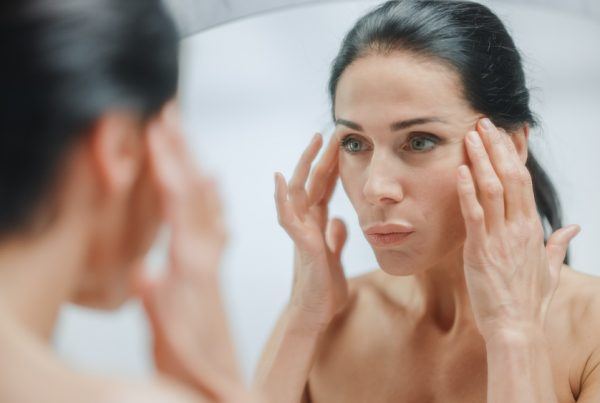Textured skin can be a result of many different things. It could be from genetics, sun damage, or even certain skin conditions. Whatever the cause may be, textured skin can be frustrating to deal with. If you’re looking for ways to get rid of textured skin, then look no further! Here is a complete guide with everything you need to know.
One way to solve this problem is light therapy. It is a great way to improve your skin texture without having to use any harsh chemicals. Pay attention to the best handheld led light therapy device, where you can see a great selection.
Also, below, we will list some of the most effective methods on how to get rid of textured skin. Be sure to try out a few and see which one works best for you!
What is textured skin, and what causes it?
Textured skin is a type of skin that has a rough, bumpy texture. It has a thicker, more resilient outer layer of skin that is more resistant to damage.
There are many possible causes of textured skin. It can be a result of genetics, sun damage, or even certain medications. Textured skin can also be a side effect of certain medical conditions, diets, and more.
- Genetics
Genetics can play a role in the development of textured skin. If you have a family history of textured skin, you may be more likely to develop it yourself. Also, certain ethnic groups are more prone to textured skin, such as those of African or Asian descent.
- Sun damage
Too much exposure to ultraviolet (UV) rays can damage collagen and elastin in your skin. This can lead to wrinkles, sagging skin, and a dull complexion. It can also lead to textured skin.
- Certain medications
Some medications, such as corticosteroids, can cause textured skin. If you’re taking a medication that is causing textured skin, talk to your doctor about other options.
- Medical conditions
Eczema and psoriasis are two medical conditions that can cause textured skin. If you have one of these conditions, you may also have other symptoms, such as dryness, itchiness, and redness.
- Stress
Stress can cause a number of skin problems, including textured skin. When you’re stressed, your body produces more of the hormone cortisol. This hormone can lead to inflammation and other skin problems.
- Poor diet
Eating a diet that is high in sugar and refined carbohydrates can cause textured skin.
 These foods can trigger inflammation and make skin problems worse. So, if you’re looking to improve your skin, it’s important to eat a healthy diet.
These foods can trigger inflammation and make skin problems worse. So, if you’re looking to improve your skin, it’s important to eat a healthy diet.
- Allergies
Allergies can also cause textured skin. If you have an allergy to something that you’re exposed to, your skin may become bumpy and itchy. Also, if you have an allergy to a certain food, you may develop textured skin after eating it.
What are the different skin texture types?
Dry or dehydrated skin texture is often caused by a lack of water in the upper layers of skin. Skin can feel dry, tight, and flaky. Dry skin is also more susceptible to developing wrinkles.
Oily skin texture is the result of overactive sebaceous glands that produce too much sebum. This can cause pores to become clogged, leading to breakouts. Oily skin also has a shiny appearance.
Sensitive skin texture may be caused by a number of factors, including genetics, environmental triggers, and underlying medical conditions. The skin may feel irritated, itchy, or red.
 Depending on what type of skin you have, you may need to adjust your skincare routine. For example, if you have dry skin, you may need to use a more hydrating cleanser and moisturizer. If you have oily skin, you may need to use products that help control oil production. If you have sensitive skin, you may need to avoid certain ingredients or use products that are specifically designed for sensitive skin.
Depending on what type of skin you have, you may need to adjust your skincare routine. For example, if you have dry skin, you may need to use a more hydrating cleanser and moisturizer. If you have oily skin, you may need to use products that help control oil production. If you have sensitive skin, you may need to avoid certain ingredients or use products that are specifically designed for sensitive skin.
How to get rid of textured skin
Textured skin can be frustrating, especially if you don’t know how to get rid of it. Here are a few tips on how to get rid of textured skin:
- Use a gentle cleanser
A harsh cleanser can strip away your natural oils, leaving your skin dry and irritated. Choose a gentle, non-abrasive cleanser to avoid further aggravating your skin.
- Moisturize
Keeping your skin hydrated is key to preventing textured skin. Choose a moisturizer that is suitable for your skin type and apply it daily. For example, if you have oily skin, look for a light, oil-free moisturizer.
- Exfoliate regularly
If you have textured skin, you may need to exfoliate more often than someone with normal skin.

Studio shot of a beautiful young woman using sea salt in her beauty routine
Be careful not to overdo it, though – too much exfoliation can damage your skin. A good rule of thumb is to exfoliate once or twice a week.
- Use a serum or cream with retinol
Retinol is a powerful ingredient that can help to smooth out textured skin. Look for a serum or cream that contains retinol and use it as directed. You may need to use it for several weeks before you see results.
- Use sun protection
Protecting your skin from the sun’s harmful rays is important for preventing textured skin. Be sure to use sunscreen with an SPF of at least 30 and reapply it every two hours when you are outdoors.
- See a dermatologist
If you are struggling to get rid of textured skin, it may be time to see a dermatologist. A dermatologist can prescribe medication or give you other tips on how to improve your skin.
If you follow these tips, you should see a noticeable improvement in your textured skin. Remember to be patient – it may take several weeks or months to see results.
Conclusion
Textured skin can be frustrating, but with the right treatment plan and some patience, you can achieve the smooth skin you’ve been dreaming of. Talk to your dermatologist about which options are best for you, and follow the tips laid out in this guide to get on your way to flawless skin.
Also, keep in mind that textured skin is often a result of genetics and not always something that can be completely cured. But with the right management, you can minimize the appearance of texture and achieve the smooth skin you’ve always wanted.
Who is the author?
 Jessie Luis is a public health expert and a contributor at Heliotherapy Institute. He aspires to continuously contribute an in-depth range of health guides, helpful information, and product reviews on health and beauty while providing valuable tips with his written articles.
Jessie Luis is a public health expert and a contributor at Heliotherapy Institute. He aspires to continuously contribute an in-depth range of health guides, helpful information, and product reviews on health and beauty while providing valuable tips with his written articles.





![women [longevity live]](https://longevitylive.com/wp-content/uploads/2020/01/photo-of-women-walking-down-the-street-1116984-100x100.jpg)








